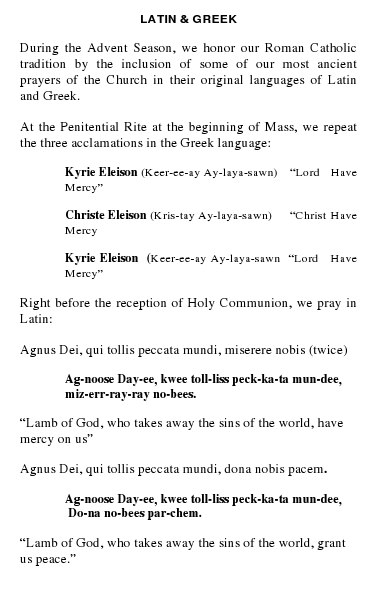
With those bad “phonetic” spellings, it might be painful to hear, but I guess they have to start somewhere.
8 comments
Leave a comment
You must be logged in to post a comment.

With those bad “phonetic” spellings, it might be painful to hear, but I guess they have to start somewhere.
You must be logged in to post a comment.
RC, read the phonetic spellings aloud in a Boston accent and all shall be revealed. Still, given ’em credit for running the Greek and Latin! Cheers, MCNS
Hooked on phonics worked for me!
This reminds me of a friend of mine. When he first started learning Latin, he pronounced it with…a Southern drawl. I’m not even going to try to represent what that sounded like !
(BTW, his Latin pronunciation has vastly improved since then, which is good because he is joining an Institute of priests who celebrate the Tridentine Mass ! Prayers for him as he prepares for seminary would be very welcome. )
The Agnus Dei ones are pretty good if you ask me, except for the pacem. I’m sure you don’t like thinking of Agnus as “Ag-noose”, but, c’est la vie. They do need accents, though. And “mun-dee” should be “MOON-dee”.
The Greek is butchered though. Naturally “Ay-laya” should be “ee-LAY-ah”. When I see “laya” I want to make it rhyme with “Maya” which is not right.
“Ag-noose” doesn’t work either; there’s no hard “g” sound there. \
Kih-rih-yeh eh-leh-ee-sohn, maybe.
eh, this is what it sounds like when us Texans try to do that pho-netic spellin’.
Sounds ok to me.
Ouch!!! Re-reading these, MCNS’s comments about the Boston accent make sense, but still! The bulletin really needs to give a better and more detailed idea of how these “phonetic” pronunciations are really pronounced. And there should be stress marks also. Maybe something like this:
**********
Agnus Dei, qui tollis peccata mundi, dona nobis pacem
Ah’-nyoos Day’-ee , kwee’ toll’-lees peh’-kah-tah” moon’-dee, doh’-nah noh’-bees pah’-chem
notes
(1) the “gn” in “Agnus” is pronounced with an “ny” sound like the “ni” in “onion” or the Spanish n~ (the letter “n” with a tilde)
(2) the “lis” in “tollis” is prounced with the sound of a long e; it sounds like the word “lease”
(3) the “mun” in “mundi” sounds like the word “moon”
(4) the “pa” in “pacem” is pronounced without an r-sound
**********
This might make for a long-ish bulletin insert, but something like that would probably give people a better idea of how these really sound, although the notes probably should also reflect ways to keep people away from regional pronunciations.
I’m with Mark. Sounds like good Texan Latin/Greek to me!